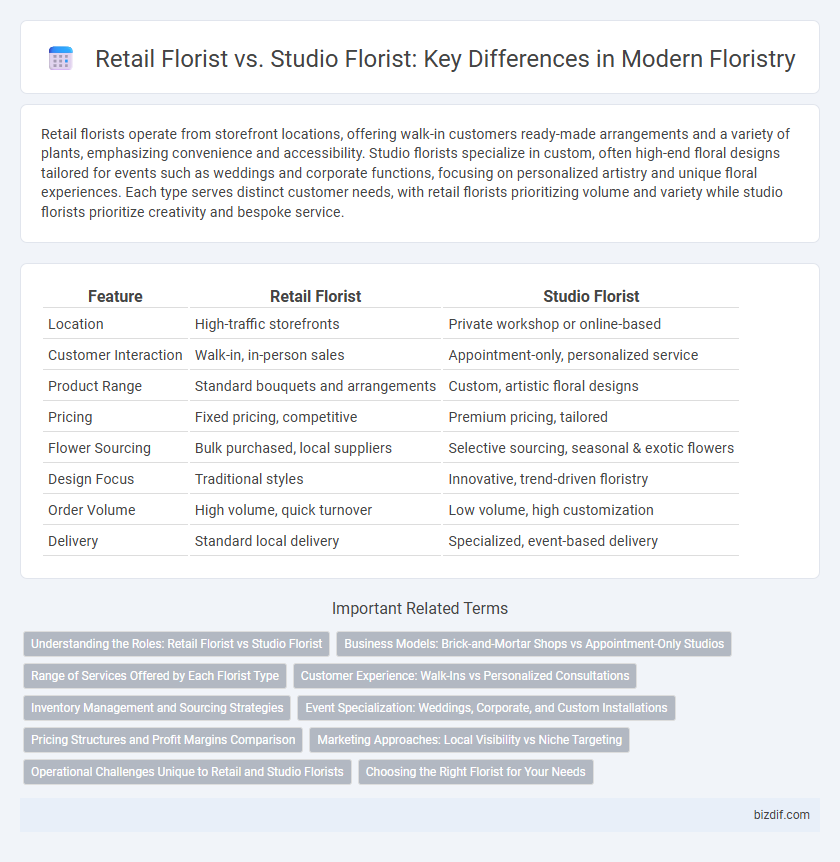Retail florists operate from storefront locations, offering walk-in customers ready-made arrangements and a variety of plants, emphasizing convenience and accessibility. Studio florists specialize in custom, often high-end floral designs tailored for events such as weddings and corporate functions, focusing on personalized artistry and unique floral experiences. Each type serves distinct customer needs, with retail florists prioritizing volume and variety while studio florists prioritize creativity and bespoke service.
Table of Comparison
| Feature | Retail Florist | Studio Florist |
|---|---|---|
| Location | High-traffic storefronts | Private workshop or online-based |
| Customer Interaction | Walk-in, in-person sales | Appointment-only, personalized service |
| Product Range | Standard bouquets and arrangements | Custom, artistic floral designs |
| Pricing | Fixed pricing, competitive | Premium pricing, tailored |
| Flower Sourcing | Bulk purchased, local suppliers | Selective sourcing, seasonal & exotic flowers |
| Design Focus | Traditional styles | Innovative, trend-driven floristry |
| Order Volume | High volume, quick turnover | Low volume, high customization |
| Delivery | Standard local delivery | Specialized, event-based delivery |
Understanding the Roles: Retail Florist vs Studio Florist
Retail florists specialize in customer-facing services, offering ready-made bouquets and walk-in purchases, while studio florists focus on custom, event-specific designs crafted in a dedicated workspace. Retail environments emphasize quick turnover and seasonal products, whereas studio florists prioritize personalized arrangements for weddings, corporate events, and bespoke orders. Understanding these roles helps clients choose the appropriate florist for their specific floral needs and occasions.
Business Models: Brick-and-Mortar Shops vs Appointment-Only Studios
Retail florists operate traditional brick-and-mortar shops that attract walk-in customers and benefit from high foot traffic, offering a wide variety of ready-made arrangements and impulse purchases. Studio florists use an appointment-only model, providing personalized floral design services tailored to client specifications, often resulting in higher profit margins due to bespoke creations. The business model choice impacts overhead costs, customer experience, and inventory management, with retail florists investing more in physical storefronts and studios focusing on customized service and scheduling efficiency.
Range of Services Offered by Each Florist Type
Retail florists typically offer a broad range of services including walk-in purchases, everyday floral arrangements, event decorations, and seasonal promotions, catering to immediate and diverse customer needs. Studio florists specialize in customized floral designs for weddings, corporate events, and luxury occasions, providing personalized consultations and elaborate, high-end arrangements. The distinction in service scope reflects retail florists' emphasis on accessibility and variety, whereas studio florists focus on bespoke artistry and detailed event planning.
Customer Experience: Walk-Ins vs Personalized Consultations
Retail florists often cater to walk-in customers, offering a quick and accessible shopping experience with pre-arranged bouquets and seasonal selections. Studio florists emphasize personalized consultations, creating custom floral designs tailored to individual preferences and special occasions. This personalized approach enhances customer satisfaction through bespoke arrangements and expert guidance.
Inventory Management and Sourcing Strategies
Retail florists maintain a broad inventory to accommodate walk-in customers, sourcing flowers from local wholesalers and seasonal markets for quick turnover. Studio florists typically manage curated, just-in-time inventory with emphasis on unique and high-quality blooms, often sourcing directly from growers or specialty suppliers. Effective inventory management in retail favors volume and variety, while studios prioritize freshness and exclusivity through strategic sourcing.
Event Specialization: Weddings, Corporate, and Custom Installations
Retail florists typically offer a wide range of floral products for everyday occasions, focusing on walk-in customers, while studio florists specialize in event-driven designs such as weddings, corporate events, and custom installations, providing tailored services and high-end arrangements. Studio florists often collaborate closely with clients to create unique, thematic floral decor that complements event settings, emphasizing creativity and customization. Expertise in large-scale installations and event coordination distinguishes studio florists from retail counterparts, catering to intricate client needs and creating impactful visual experiences.
Pricing Structures and Profit Margins Comparison
Retail florists typically operate with higher overhead costs such as storefront rent and staff salaries, leading to lower profit margins despite higher individual item pricing. Studio florists often use a made-to-order model with lower fixed expenses and direct customer engagement, resulting in more flexible, competitive pricing and potentially higher profit margins per arrangement. Pricing structures in retail floristry emphasize volume sales with standardized products, whereas studio florists focus on customized, premium designs commanding price premiums aligned with artisanal craftsmanship.
Marketing Approaches: Local Visibility vs Niche Targeting
Retail florists prioritize local visibility through storefront displays, community events, and walk-in customer engagement to drive consistent foot traffic and immediate sales. Studio florists focus on niche targeting by leveraging online platforms, curated social media campaigns, and personalized client experiences to attract specialized markets such as weddings or corporate events. Both marketing approaches optimize customer reach but differ in scale and engagement strategies tailored to their business models.
Operational Challenges Unique to Retail and Studio Florists
Retail florists manage high customer traffic and immediate sales demands, requiring efficient inventory turnover and quick floral arrangement preparation. Studio florists face complexities in custom order management, personalized design processes, and extended production timelines, necessitating meticulous scheduling and resource allocation. Both types encounter unique supply chain challenges but differ significantly in balancing walk-in sales versus bespoke floral artistry.
Choosing the Right Florist for Your Needs
Retail florists typically operate in high-traffic locations offering ready-made bouquets and a wide variety of flowers for immediate purchase, ideal for customers seeking convenience and quick service. Studio florists focus on custom floral designs, specializing in tailored arrangements for events such as weddings and corporate functions, emphasizing creativity and personalized service. Selecting the right florist depends on whether you need fast, everyday flowers or intricate, bespoke floral artistry for special occasions.
Retail Florist vs Studio Florist Infographic

 bizdif.com
bizdif.com